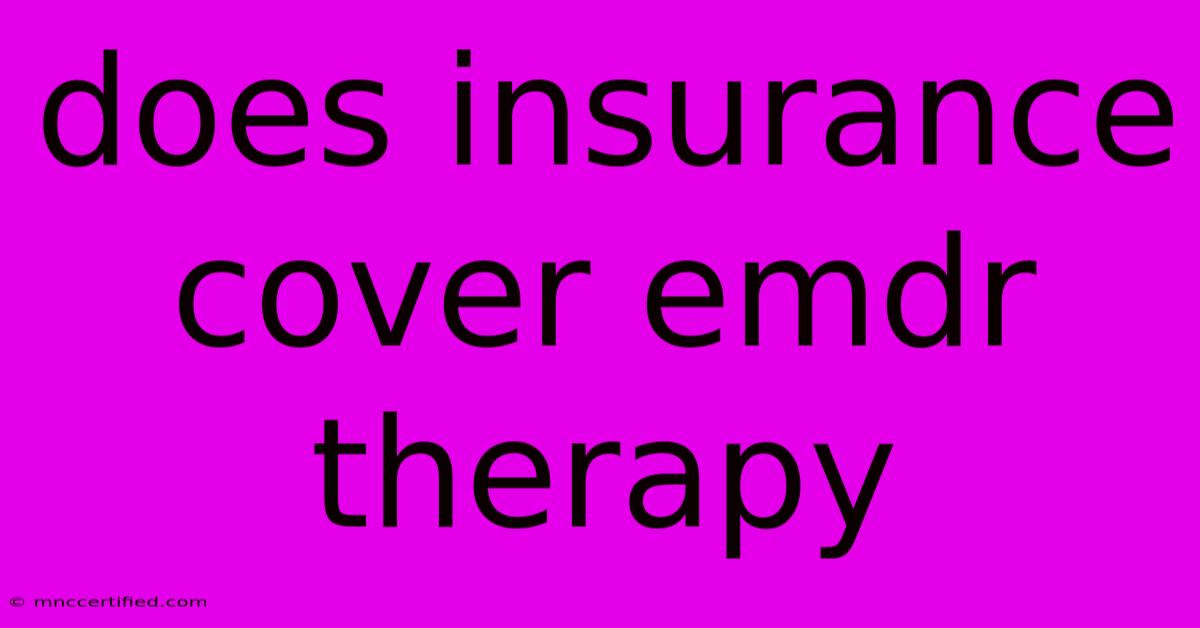Does Insurance Cover Emdr Therapy

Table of Contents
Does Insurance Cover EMDR Therapy? A Comprehensive Guide
EMDR (Eye Movement Desensitization and Reprocessing) therapy is a highly effective treatment for trauma, PTSD, and anxiety. But a common question potential clients have is: Does my insurance cover EMDR therapy? The answer, unfortunately, isn't a simple yes or no. Coverage varies significantly depending on several factors. This comprehensive guide will help you navigate the complexities of insurance coverage for EMDR.
Factors Affecting EMDR Insurance Coverage
Several key factors determine whether your insurance plan will cover EMDR therapy:
-
Your Insurance Provider: Different insurance companies have different policies. Some may explicitly cover EMDR as a covered benefit under your mental health coverage, while others might not. Check your policy's specific details regarding mental health benefits and psychotherapy. Look for terms like "outpatient mental health services," "psychotherapy," or specific mentions of trauma-focused therapies.
-
Your Plan's Benefits: Even if your insurance provider covers mental health services, your specific plan may limit coverage. This includes factors like:
- Number of sessions: Many plans have a limited number of sessions covered per year.
- Pre-authorization: Some plans require pre-authorization before starting EMDR therapy. This means you need to get approval from your insurance company before your sessions can begin.
- Network providers: Your plan may only cover EMDR therapy if provided by a therapist within their network.
-
Your Therapist's Credentials: Ensure your therapist is a licensed mental health professional and is experienced in EMDR. Many insurance companies only cover services provided by licensed clinicians. Check if your therapist is in-network with your insurance provider. This is crucial to maximizing your coverage and minimizing out-of-pocket costs.
-
Diagnosis: The diagnosis for which you are seeking EMDR therapy also plays a role. EMDR is commonly used for PTSD, anxiety disorders, and trauma, but the specific diagnosis may influence coverage decisions. Your therapist will provide the necessary diagnostic codes for billing purposes.
How to Find Out if Your Insurance Covers EMDR
Here's a step-by-step guide to determine your coverage:
-
Review your insurance policy: Carefully read your policy documents or access your online member portal to understand your mental health benefits. Look for specific terms related to psychotherapy and trauma-focused therapies.
-
Contact your insurance provider: Call your insurance company's customer service number. Have your policy number and the CPT code for EMDR therapy (90837) readily available. Ask directly if EMDR is covered, the extent of coverage, and any pre-authorization requirements.
-
Check with your therapist: A qualified EMDR therapist can often provide guidance on insurance coverage. They may have experience working with your specific insurance provider and can help you navigate the process.
-
Verify in-network status: Confirm if your chosen therapist is in-network with your insurance provider. This will significantly reduce your out-of-pocket costs.
What to Do if EMDR isn't Covered
If your insurance doesn't cover EMDR, don't despair. Several options are available:
- Explore alternative therapies: Other effective therapies can treat trauma and related conditions.
- Negotiate with your therapist: Some therapists offer sliding scale fees based on income.
- Consider a payment plan: Discuss payment plans with your therapist to make EMDR therapy more manageable.
- Seek financial assistance: Explore options like grants or loans specifically designed to support mental healthcare access.
Conclusion
Determining whether your insurance covers EMDR therapy requires thorough research and communication. By understanding the factors that influence coverage and taking proactive steps to verify your benefits, you can increase your chances of accessing this valuable treatment. Remember, proactive communication with your insurance provider and therapist is key to ensuring a smooth process. Don't hesitate to ask questions – your mental health is paramount.

Thank you for visiting our website wich cover about Does Insurance Cover Emdr Therapy. We hope the information provided has been useful to you. Feel free to contact us if you have any questions or need further assistance. See you next time and dont miss to bookmark.
Featured Posts
-
New Gmail Feature Dummy Email Addresses
Nov 19, 2024
-
Scotlands Clarke Selection Headache
Nov 19, 2024
-
Martial Arts Instructor Insurance
Nov 19, 2024
-
Car Insurance West Springfield Ma
Nov 19, 2024
-
Roof Debris Falls At Cowboys Home
Nov 19, 2024